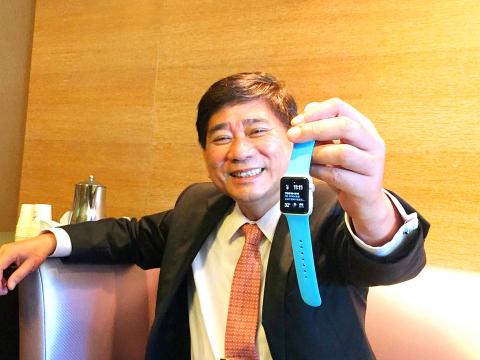Catcher Technologies Co (可成科技), which supplies metal casings for Apple Inc’s iPhones, yesterday revised upward its sales guidance for next quarter, citing increasing demand for smartphone and notebook products.
“Thanks to the smoother production and strong orders for metal casings for new projects, we now forecast the next quarter will be better than this quarter,” Catcher chairman Allen Hung (洪水樹) told a media briefing after the firm’s shareholders’ meeting in Tainan.
In an investors’ conference on April 29, Horng said the company’s revenue next quarter would be flat from this quarter due to the dissipating product cycle for existing projects.

Photo: CNA
In the first five months of this year, Catcher made NT$31.33 billion (US$1 billion) in sales, up 64.05 percent from a year earlier.
Hung said the strong sales performance bodes well for the company throughout this year.
Hung said sales this month would drop slightly from last month’s NT$6.85 billion due to a traditional slow season, but they would pick up significantly from next quarter.
“Sales in the fourth quarter of this year will expand further from the third quarter,” Catcher spokesman James Wu (巫俊毅) said.
Hung said the predicted momentum is based on larger order allocations from its major smartphone clients this year.
Commenting on one of its clients’ new smartphone projects, Hung said a surface treatment on a harder metallic material is more difficult than traditional metal-casing processes and would lower the yield rate at the beginning of the production cycle.
“However, it will not be a major issue for Catcher, as we keep improving our techniques,” Hung said.
Despite soft demand for PCs and weaker-than-expected smartphone sales, Hung said the firm does not worry about its business outlook, because Catcher’s main clients are doing well in the notebook computer and smartphone segments.
“Overall, our main clients are on the winning team,” he said.
In a bid to meet rising demand from clients, Catcher raised its capital expenditure by 35 percent from a year earlier to NT$6.76 billion in the first half of this year, Hung said, adding that the funds will be mainly be used to build new factories.
He said that capital expenditure for the second half of this year would be flat from the first half, mainly because of equipment purchases.
“Overall, capital expenditure for this year is to be lower than last year’s NT$23.2 billion,” he said.
Hung said he is upbeat about Catcher’s ability to outpace rivals for at least five years, adding that the firm’s advanced technologies and techniques in metal casing treatments for various products put it in a strong position.
Despite market concerns about rising competition from Casetek Holdings Ltd (鎧勝) and FIH Mobile Ltd (富智康) regarding orders of Apple MacBook and tablet products, Catcher remains confident about its technological edge.
“Tell me, which company should Catcher be worried about?” Hung asked shareholders.
Metal casing treatments are more delicate and complicated than people imagine, he said, adding that the work requires more than just advanced equipment.

The US dollar was trading at NT$29.7 at 10am today on the Taipei Foreign Exchange, as the New Taiwan dollar gained NT$1.364 from the previous close last week. The NT dollar continued to rise today, after surging 3.07 percent on Friday. After opening at NT$30.91, the NT dollar gained more than NT$1 in just 15 minutes, briefly passing the NT$30 mark. Before the US Department of the Treasury's semi-annual currency report came out, expectations that the NT dollar would keep rising were already building. The NT dollar on Friday closed at NT$31.064, up by NT$0.953 — a 3.07 percent single-day gain. Today,

‘SHORT TERM’: The local currency would likely remain strong in the near term, driven by anticipated US trade pressure, capital inflows and expectations of a US Fed rate cut The US dollar is expected to fall below NT$30 in the near term, as traders anticipate increased pressure from Washington for Taiwan to allow the New Taiwan dollar to appreciate, Cathay United Bank (國泰世華銀行) chief economist Lin Chi-chao (林啟超) said. Following a sharp drop in the greenback against the NT dollar on Friday, Lin told the Central News Agency that the local currency is likely to remain strong in the short term, driven in part by market psychology surrounding anticipated US policy pressure. On Friday, the US dollar fell NT$0.953, or 3.07 percent, closing at NT$31.064 — its lowest level since Jan.

The New Taiwan dollar and Taiwanese stocks surged on signs that trade tensions between the world’s top two economies might start easing and as US tech earnings boosted the outlook of the nation’s semiconductor exports. The NT dollar strengthened as much as 3.8 percent versus the US dollar to 30.815, the biggest intraday gain since January 2011, closing at NT$31.064. The benchmark TAIEX jumped 2.73 percent to outperform the region’s equity gauges. Outlook for global trade improved after China said it is assessing possible trade talks with the US, providing a boost for the nation’s currency and shares. As the NT dollar

The Financial Supervisory Commission (FSC) yesterday met with some of the nation’s largest insurance companies as a skyrocketing New Taiwan dollar piles pressure on their hundreds of billions of dollars in US bond investments. The commission has asked some life insurance firms, among the biggest Asian holders of US debt, to discuss how the rapidly strengthening NT dollar has impacted their operations, people familiar with the matter said. The meeting took place as the NT dollar jumped as much as 5 percent yesterday, its biggest intraday gain in more than three decades. The local currency surged as exporters rushed to